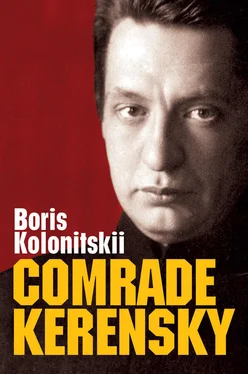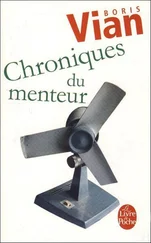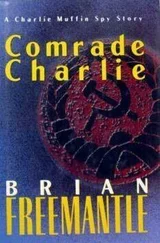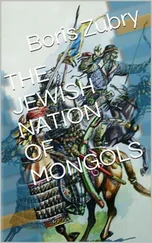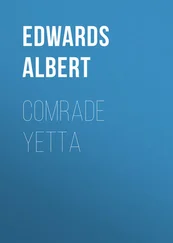Kerensky never tired of showing his respect for the veterans of the revolutionary movement, provided they were supportive of his policies. Their authority was a valuable asset which bolstered his influence. At the Congress of the Socialist Revolutionaries he referred with demonstrative piety to the party’s ‘teachers’, ‘guides’ and ‘doughty champions’. Kerensky modestly referred to himself as one of the disciples and rank-and-file workers, one of the Socialist Revolutionary Party’s younger generation which, in the period of reaction, feeling its way in the dark, had, as best it could, carried forward the ‘spark of our party’s faith and way of life’. Concluding his speech, Kerensky told the delegates that, having gained so much from rubbing shoulders with the ‘best champions, he nevertheless always strove to feel, if for only a moment, that he was once again their ordinary, insignificant fellow party member and comrade.’ 232Speaking earlier, at the All-Russia Congress of Soviets of Peasants’ Deputies, he had said much the same thing: ‘Old teachers came to my aid whose names we have known since childhood.’ 233
In the first weeks of the revolution Kerensky appeared several times at public ceremonies in the company of the veteran revolutionary Vera Figner. She gave her support to a number of his initiatives – for example, heading a fund he created as minister of justice to support former political prisoners. In a single week, 17–24 March, 340,000 rubles were donated for their needs. The donations were addressed to Vera Figner and Olga Kerenskaya. Including money previously sent to Olga Kerenskaya, the final total of donations amounted to 2,135,000 rubles. 234Such a huge response testifies to the respect enjoyed by Kerensky, and the participation of Figner gave the venture even greater reach. The ability to extend support to former prisoners and exiles, many of whom were joining the political elite of revolutionary Russia, was a valuable political lever for the minister.
Of particular importance for Kerensky was his friendship with Yekaterina Breshko-Breshkovskaya, which underlay their later political cooperation. They met in 1912 when he had travelled to Siberia. One of Kerensky’s first actions when he became minister of justice was to order her immediate release. He demanded, moreover, that the local authorities should convey her with due pomp and ceremony to the capital. On 29 March, when, after a triumphal progress, she finally arrived in Petrograd, Kerensky was there to meet and spend the day with her. Sharp tongues scoffed that he was playing the role of page-boy to a grandmother. Breshkovskaya was naturally flattered by the attention paid to her by the popular hero of the February Revolution.
At Kerensky’s suggestion, the old revolutionary lady lived in his residences: first in the Ministry of Justice building and later in the Winter Palace. During working lunches attended by politicians and diplomats she acted as hostess. Breshko-Breshkovskaya reminisced later, ‘I went with him to the headquarters of the minister of justice, and he put me up there. I kept asking how I could find a place to stay, but he was having none of it. “Don’t you find it comfortable here?” And so we remained good, true friends all that time. In fact, I will say, forever.’ 235The former revolutionary did not always feel at ease in the tsar’s old quarters but acceded to Kerensky’s request. ‘I wanted to be set free again, but could not bring myself to leave. I could not deny Alexander Fyodorovich’s wish to have me as his neighbour,’ she recalled. 236
In 1917 Breshkovskaya spoke about her special ties with Kerensky. Her speech in April in Revel, where she had gone with the minister of justice, is illustrative: ‘The strength of the Provisional Government is that it includes Kerensky, a socialist, a devoted friend of the people. You have a loyal friend, and that friend is Kerensky. He and I are kith and kin, related not by family ties, but in spirit.’ 237
The friendship between the grandmother of the Russian Revolution and her ‘grandson’ was of considerable political importance for both of them. Breshko-Breshkovskaya was a living legend for the Socialist Revolutionaries. For decades she had been praised by the party. Her biography was presented as the life of a martyr who had dedicated herself to service of the people. The moral and political backing of such an illustrious champion of freedom reinforced Kerensky’s standing and sanctified his actions. For Breshko-Breshkovskaya too, however, the alliance was important: her young ally was proof that she had been right, and justified the battle she had waged against the regime for the whole of her life. Kerensky was the personification of a new generation of revolutionaries who were successfully carrying forward the mission she had begun so long ago. At the same time, the revolutionary minister was a guide for the old Narodnik warrior in the complicated and sometimes confusing world of modern politics.
The relationship between Kerensky and Breshko-Breshkovskaya was warm and relaxed, and it remained so in later years when both were in exile. In her memoirs she refers to him as the most outstanding member of the Socialist Revolutionary Party. 238(Other Socialist Revolutionary leaders might not have agreed.) In a different version of her memoirs there is an even more ecstatic description of Kerensky: ‘He has always lived, and probably always will, with the most positive imaginable belief in the future of mankind in general and of the Russian people in particular. This quality of his soul, this great talent of selfless love and an unbounded willingness to serve his people are probably what provided the foundation of the mutual understanding which formed between him and me. I have the greatest respect for this man. I admire his personality as among the best things our land has ever produced.’ 239
In 1917 Breshkovskaya spoke publicly of her admiration for what Kerensky was doing. After visiting Taurida province, she had this to say about the morale of the inhabitants of Crimea (believing that everyone who came to her speeches or with whom she spoke shared her attitude towards the revolutionary minister).
Nor is there any mistrust of the new composition of the Provisional Government, although those who comprise it are not particularly well known.
This drawback is satisfactorily dealt with by confidence that, as long as Alexander Fyodorovich Kerensky is one of the ministers, nothing bad will be allowed to happen. In the five years that the repute of Kerensky has stood untarnished in the arena of Russia’s politics, the population, even in remote corners of our far-flung land, has come to revere his name and to see it as a guarantee of truth, lawfulness and justice. They have come to see him as a knight, always resolute, always prepared to occupy the most dangerous positions in pursuing his ideal of selfless service to his motherland. To his people. 240
In the autumn of 1917, Breshko-Breshkovskaya tried to shield the head of the Provisional Government from attacks from the left and right, reminding people of the biography of a hero who was sacrificing his health, and perhaps even his life, to the cause of the revolution. ‘He has given a full decade of his young life to Russia, sparing neither his strength, his health, nor his very life.’ 241
Whenever Kerensky’s authority was under threat, he and his supporters sought to shore it up by recalling his biography as a champion of freedom and authenticating his reputation with the aid of authoritative endorsement from veterans of the revolutionary movement.
* * *
All manner of conflicts of the time are reflected in the controversies around the accounts of Kerensky’s life, and these conflicts are, in many ways, of interest. Particular aspects of Kerensky’s life – his social antecedents, his family ties with the bureaucratic elite, and a number of scenes caused by his actions in the State Duma – were omitted or hushed up. Others recur in the various biographies and biographical articles, in resolutions and newspaper reports, and, indeed, in autobiographies, in Kerensky’s speeches and even in the orders he issued. The biographical elements of particular importance for establishing his revolutionary credentials were occasions when he was persecuted by the old regime, his clandestine activities, his legal defence of political cases in court, and his bold and ‘prophetic’ speeches in the State Duma. Then there were his actions in late February, of which the most spectacular was bringing the mutinous soldiers into the Tauride Palace. The references back to his biography served to substantiate the status of a ‘tried and tested’, tireless champion of freedom, a prerequisite for the image of a revolutionary Leader. Much was made also by some biographers of the gift of foresight they believed he possessed. To have been able to ‘prophesy’ the revolution was surely also grounds for qualifying as a charismatic leader.
Читать дальше
